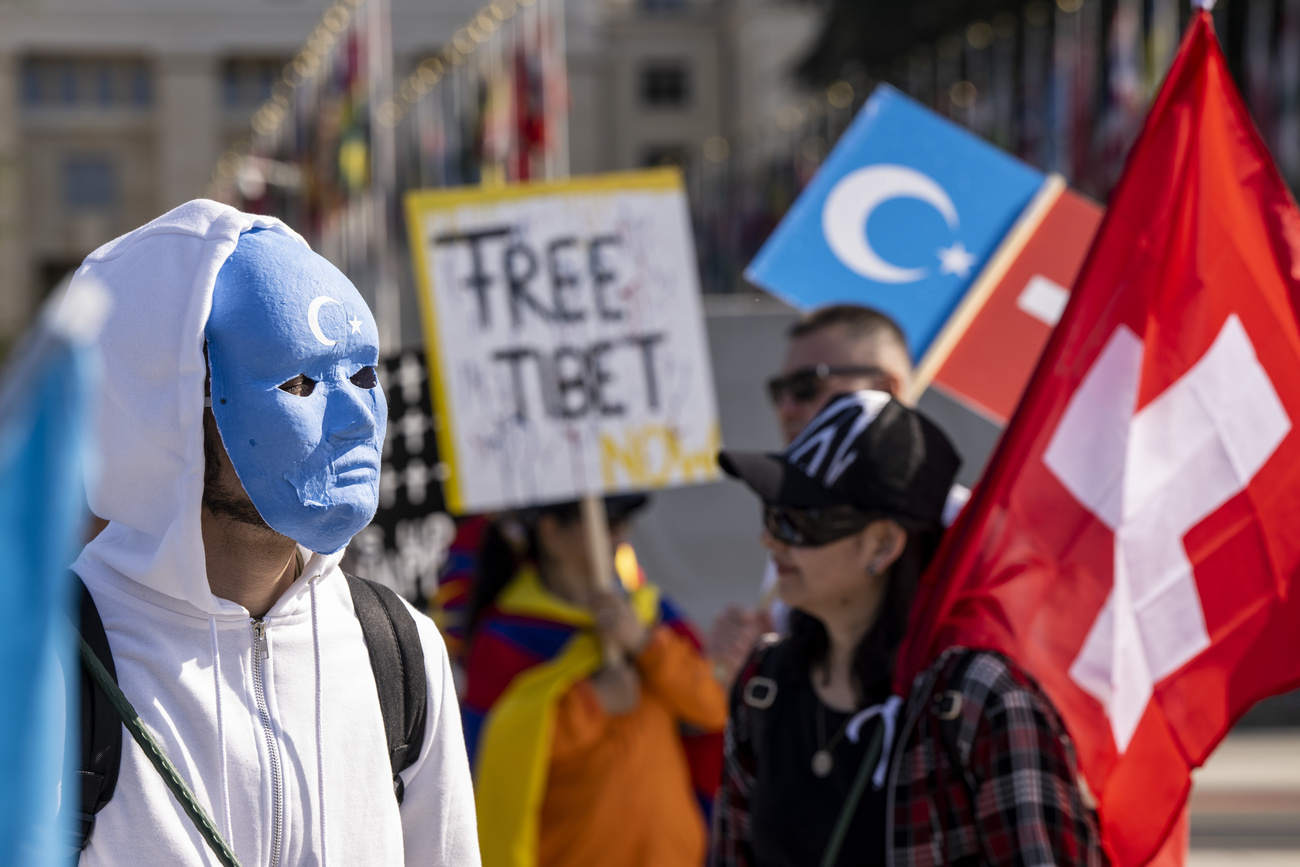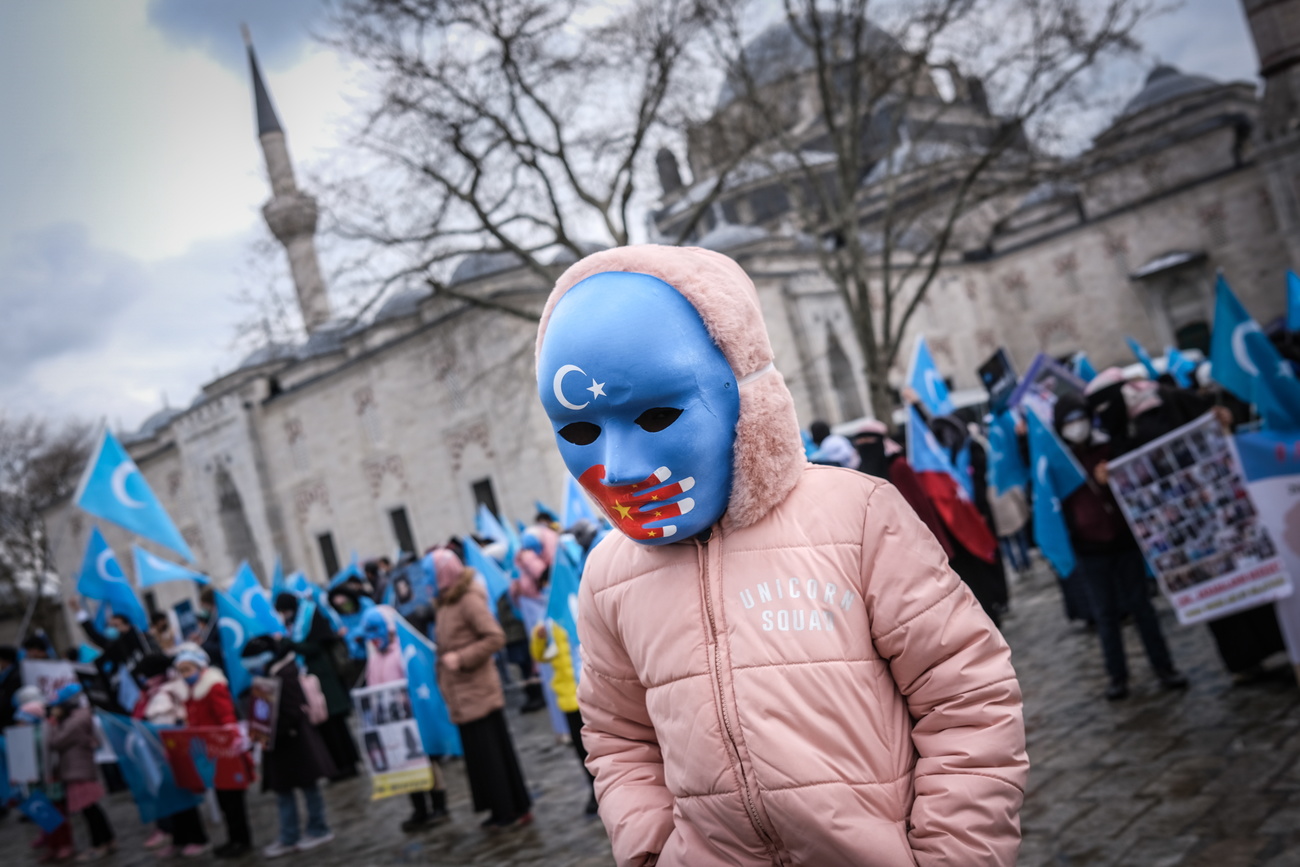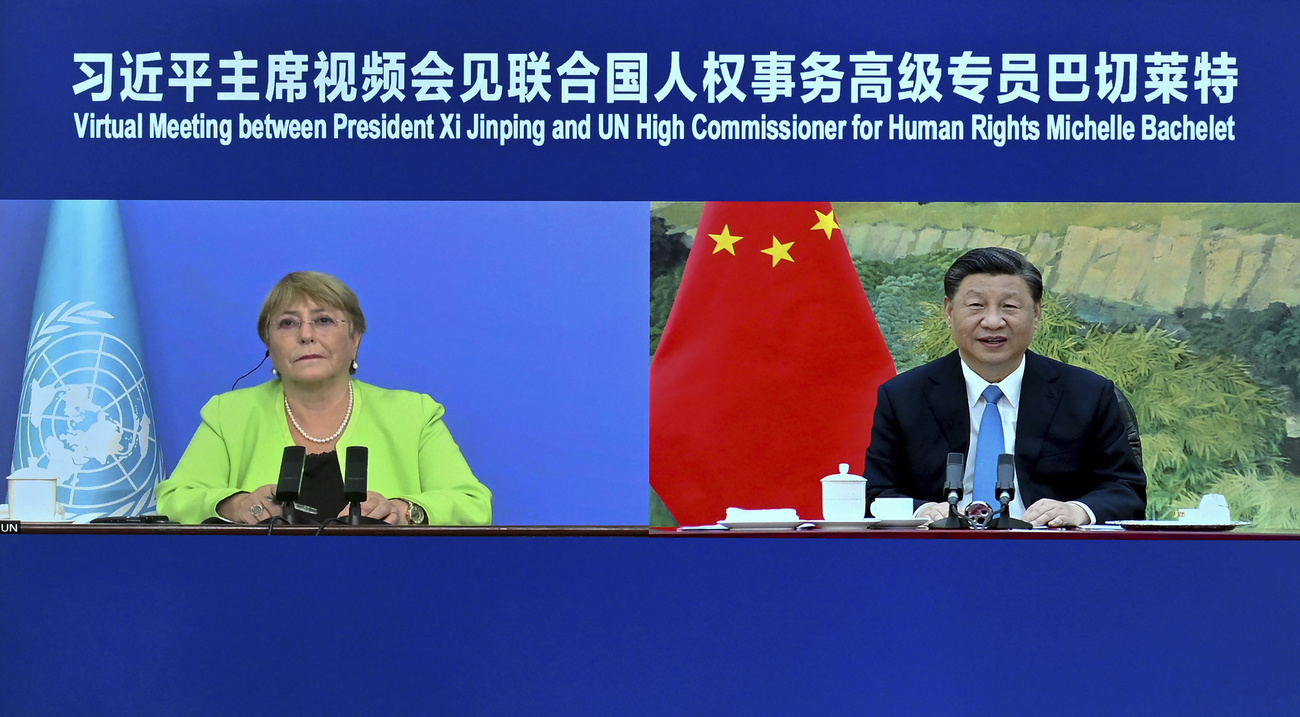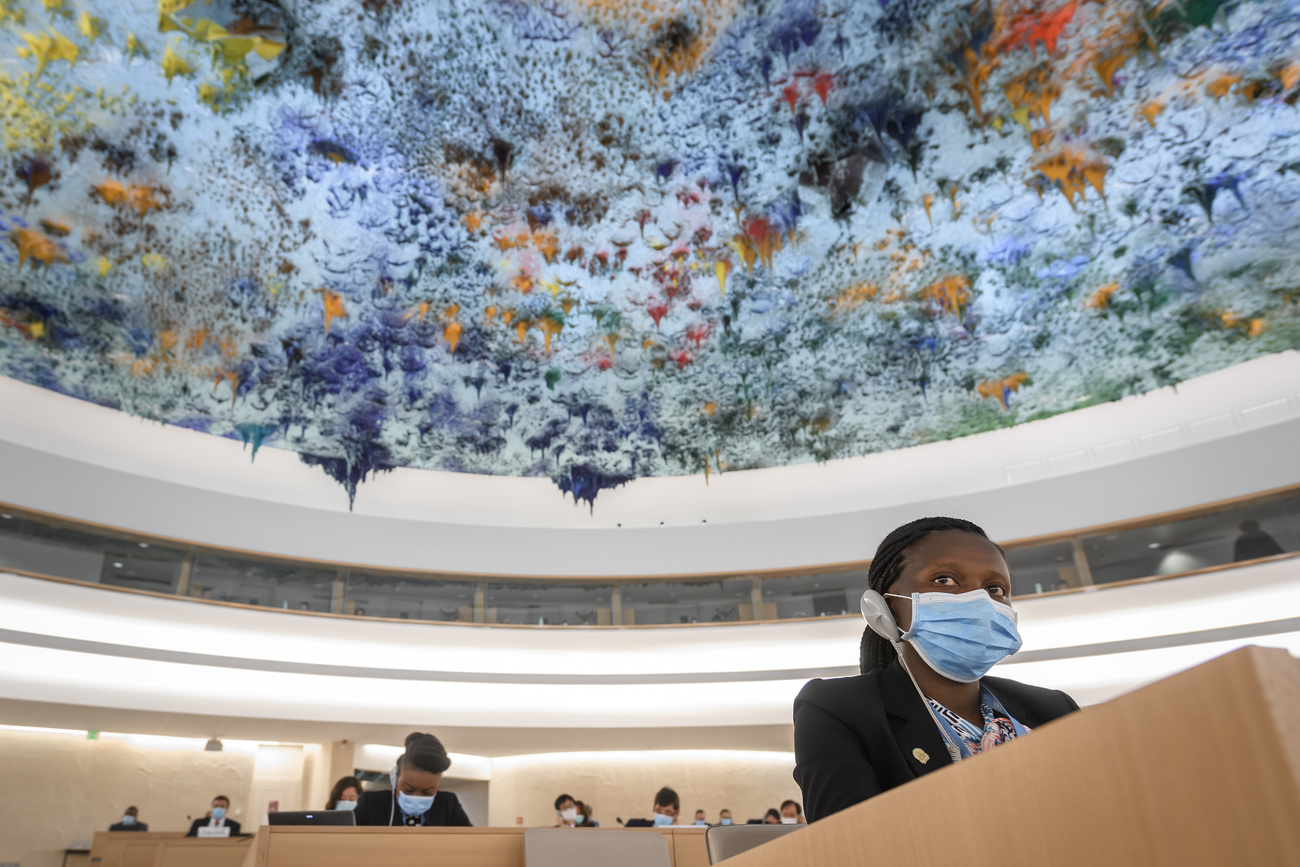How China is rewriting human rights norms

Beijing wants to promote its own vision of human rights and bend the UN system to suit its authoritarian regime. The struggle is taking place in the meeting rooms of the United Nations Palais des Nations in Geneva.
In February, during the high-level section of the Human Rights Council, China’s ambitions to reshape global norms were on full display.
Speaking to a crowd of heads of states and ministers, China’s former minister of foreign affairs, Qin Gang, who has since gone missing and been replaced, saidExternal link his country would “follow a Chinese path of human rights development” that “meets the trend of the times and suits its national conditions”.
Since president Xi Jinping came to power in 2012, China’s increasing use of repressive domestic policies, from Xinjiang to Tibet and Hong Kong, has been a growing source of concern for NGOs and United Nations experts who took notice of the second world power’s disregard for international human rights law.
“I think China would like the UN to be seen as just a technical or advisory body not really able to speak with moral authority,” says Rana Siu Inboden, an adjunct assistant professor at the University of Texas at Austin.
In recent years, Beijing’s contempt for existing norms has also become more visible in the speeches of its diplomats during meetings held at the Palais des Nations in Geneva, home to the UN’s European headquarters.
They say the UN’s top rights body should focus on “constructive dialogue”, abstain from “finger pointing” and not use human rights concerns as an excuse for “meddling in other countries’ internal affairs”.
Referring to the UN Universal Declaration of Human Rights, “a milestone in the international human rights cause” which turns 75 this year, Qin Gang said that recent challenges, from the Covid pandemic to world hunger and climate change, raised the question of “how to better promote and protect human rights?”
As an answer, he invited more countries to not “copy the model of others” but rather choose their “own path of human rights development” that takes account of their unique “historical background, cultural heritage, national conditions and people’s needs”. At the same time, and somewhat contradictorily, Qin Gang stressed the “indivisible” nature of human rights.
Bend the rules
“The Chinese government wants to ensure that the international system is favourable to authoritarian countries,” says Teng Biao, a Chinese human rights scholar and activist who is now a visiting professor at the University of Chicago.
The parts of the UN human rights system that China opposes are the so-called “Special Procedures” and “Treaty Bodies” divisions, through which groups of independent experts investigate human rights violations and review how countries implement treaties they have ratified.
China has signed and ratified the International Covenant on Economic, Social and Cultural Rights, but only signed the International Covenant on Civil and Political Rights, which means it is legally bound only by the former. Beijing argues Western countries put too much emphasis on civil and political rights and wants to be seen as a champion of economic, social and cultural rights, despite coming under heavy criticismExternal link in March from the UN committee responsible for monitoring compliance with that treaty.
“A lot of the human rights system is about developing norms and adopting treaties, reporting and sort of abstract discussions about improvements that could be made,” says Nicholas Bequelin, a visiting fellow at Yale University and former Asia-Pacific regional director at Amnesty International. “Beijing wants to blunt and remove the accountability part, where countries are named, where special mechanisms are put in place.”
China is not the only country that uses its power to influence debates and protect allies at the UN. The US, for example, regularly opposes motions against Israel. Meanwhile, other countries, such as members of the Non-Aligned Movement, a group of 120 countries that are not formally aligned with a bloc, have also brought up in the past arguments about prioritising collaboration over confrontation. But China’s strategy differs.
“Any country that has its human rights record criticised rejects the legitimacy of the human rights framework,” says Bequelin. “What is different is that Beijing has the diplomatic and financial means to persuade many countries to follow its line and to vote alongside China on crucial votes.”
Diplomatic and economic clout
The starkest example of this was China’s ability in October last year to fend off a debate at the Human Rights Council on its treatment of Uyghurs in Xinjiang, which the UN said in a report could amount to “crimes against humanity”. Though the vote was close (19 against, 17 in favour, and 11 abstentions), it set a bad precedent and might discourage countries looking to confront China in the future.
Prior to the report’s publication in August 2022, Beijing had put all its diplomatic weight into getting the UN Human Rights Office to bury the document. Reuters news agency reported thatExternal link Beijing had circulated a letter urging former UN human rights chief Michelle Bachelet not to publish the report among diplomatic missions in Geneva to gain their support. Ahead of the vote, China had organised a two-hour press conferenceExternal link in Geneva with Xinjiang government officials to counter-argue the report’s findings.
As part of its Belt and Road Initiative launched a decade ago Beijing has invested heavily in infrastructure projects across the world. Experts argue the initiative is a debt-trap for developing countries that gives China power to influence how they vote at the UN.
Meanwhile instances of Chinese diplomats harassing and intimidating activists and experts on UN premises were documentedExternal link by Human Rights Watch. “That goes beyond normal diplomacy,” points out Inboden.
On key UN votes China is often backed by authoritarian governments, but also many developing countries.
“I think that what China does very well is that it holds a very consistent line over why the international human rights system is not legitimate to criticise developing countries. And it offers a protective shield to countries that are the target of criticism,” says Bequelin. “It’s a combination of the ability of a great power on the international stage to muster its diplomatic reach, which is much bigger in developing states than many other countries, as well as the resources that it’s willing to invest in these efforts,” he adds.
Western values
At the UN, Chinese officials will refrain from saying out loud that human rights – underpinned by the Universal Declaration of Human Rights (UDHR) – are a Western invention. But at home, the ruling Chinese Communist Party (CCP) is not afraid of using that narrative.
“The Chinese government argues that ideas like human rights or democracy come from Western countries, that China has its own special tradition and culture, and that those ideals of liberal democracy don’t suit the country,” says Teng, who calls the notion “unreasonable”.
The reality is more complex. Hans Ingvar Roth, a professor of human rights at Stockholm University, says “it’s not fair to describe it as a Western document”.
“The five main drafters of the UDHR were not all white men, there was diversity on the drafting committee,” points out Inboden. Its vice-chair was in fact a Chinese diplomat called Peng-Chun Chang.
“His role was very important. Some of the key features of the document had their origin in his thought,” says Roth, who wrote a bookExternal link on the Chinese diplomat’s contribution to the UDHR. According to him, Chang – who at the time represented the government of the Republic of China, which relocated to Taiwan when it lost the civil war – incorporated into the declaration elements derived from ancient Chinese philosophy. “What he wanted to do was create this document in light of different ethical traditions,” to make it as universal as possible, says Roth.
China’s alternative
“I don’t think that the Chinese government has a well-defined alternative conception of human rights,” says Bequelin. Beijing may be more inclined to strip existing concepts of their substance than to propose competing notions. “The real position is that the Chinese Communist Party sees human rights as something that is incompatible with its political model, which is a one-party dictatorship,” he adds.
At the Human Rights Council, China has not always been so upfront about its intentions. Until 2017, the country had never introduced a resolution of its own, which as Inboden explains is “one of the primary ways to shape ideas, norms, and human rights mechanisms”. Since then, it has passed several such motions. “All of those contain ideas that water down the specificity, the precision, the potency of human rights norms,” says Inboden. They include wordings such as “win-win” or “mutually beneficial cooperation” taken directly from the Chinese Communist Party’s playbook. “It would be like the US under the Trump administration introducing UN resolutions about ‘Making America Great Again’,” says Inboden.
The major shift has been China’s perception of its own power. From a developing country in the shadow of the US it has a become over the past three decades the world’s second-largest economy and wants to have the geopolitical clout that goes with its rising economic influence.
The vacuum the US created when it left the Human Rights Council (between 2018 and 2020) under former president Donald Trump, Xi Jinping’s aggressive approach to diplomacy, and the rise of Western-led initiatives putting the spotlight on country-specific issues have all contributed to this shift.
Grip on power
China is particularly sensitive to criticism in a forum such as the Human Rights Council, even though its decisions are not legally binding.
“I think there is a concern that what happens in the UN or what other countries think could reawaken domestic ideas about the Chinese government’s legitimacy. It’s not held accountable through elections, so I think that there are still some concerns about power,” says Inboden. The so-called “white paper” protest movement across China sparked in November 2022 by the death of at least ten Uyghurs in a fire they could not escape because of lockdown measures was “a reminder that under the surface discontent percolates in China,” adds Inboden.
The spectre of what happened following the Tiananmen protests and massacre in 1989 may also still linger. In its aftermath, China’s growth rate dropped, companies pulled out of the country, and Beijing lost leverage on the international stage. “Under the right conditions, international criticism can definitely harm a country’s national interests, both through reputational costs as well as in cases where specific sanctions are employed,” says Inboden.
Criticism of China’s human rights record on the international stage “gives legitimacy to aspirations [of political resistance] that part of China’s citizenry has,” says Bequelin. “There is concern that human rights norms are very appealing domestically to a broad swath of the population.”
But there might be another reason. “China has larger ambitions about the UN system itself and the way that international relations are conducted. It wants to usher in a new era of international relations within the UN and beyond to push it towards a system that is more favourable to authoritarian regimes,” says Bequelin. To be successful, China needs buy-in from other countries. “If China carries a bad reputation, if there are accusations of crimes against humanity hanging over its head, then that hinders these larger long-term aspirations that China has to remould the UN and organised international relations more broadly.”
READ MORE about the UN’s report on Xinjiang
- The UN released its report on rights violations in China’s Xinjiang in August 2022. Its publication had been delayed for a yearExternal link, a period during which the UN’s former human rights chief, Michelle Bachelet, came under intense pressure.
- Bachelet had long sought an official visit to China. But she came in for heavy criticismExternal link when she finally visited the country in May 2022, as the agreed terms were never made public.
- In October 2022, China defeated a Western-led motion to hold a debate on the report at the Human Rights Council. This major diplomatic win was seen as a reflection of China’s growing influence at the UN.
More than a year after the publication of the UN report on Xinjiang, the question of whether it will be followed up within UN bodies remains open. At the Human Rights Council, which currently meets in Geneva, Western countries do not appear to be ready for a new confrontation and have so far refrained from proposing a motion to increase pressure on China. Meanwhile, the human rights high commissioner Volker Türk soberly pointed out that “concerns in Xinjiang require strong remedial action by the authorities”.
Edited by Virginie Mangin

In compliance with the JTI standards
More: SWI swissinfo.ch certified by the Journalism Trust Initiative













You can find an overview of ongoing debates with our journalists here . Please join us!
If you want to start a conversation about a topic raised in this article or want to report factual errors, email us at english@swissinfo.ch.